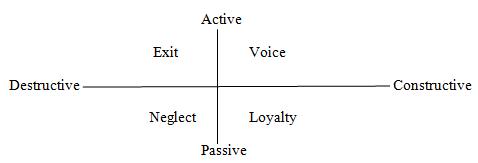Mr. Harry, Branch Manager, Luxemburg Main Branch of XYZ Bank was wondering as to what could be done to restore the punctuality of the staff in his branch. A majority of the staff members were taking time off from the work, on a number of occasions, during the day, which resulted in work remaining incomplete, and in the payment of overtime wages for its completion. The problem was generally not faced by other banks in Luxemburg, except the PQR Bank, another Indian bank having branches in Luxemburg. Other local and British banks were able to exercise sufficient control over their staff to ensure proper attendance and maintain office decorum. Initially, Mr. Harry tried to persuade the staff to be punctual. He sermonized them on several occasions. None of this, however, made any dent on the problem. Failing in these methods, he resorted to punishment of the erring members of theContinue reading
Human Resource Management
Human Resource Management (HRM) is branch of management that deals with people at work, it is concerned with the human dimensions of management of the organization. As organization consists of people, therefore acquiring them, developing their skills, providing them motivation in order to attain higher goal and ensuring that the level of commitment is maintained are the important activities.
Role Efficacy: Meaning, Aspects and Measurement
What is Role Efficacy? The performance of a person working in an organization depends on his own potential effectiveness, technical competence, managerial experience as well as the design of the role that he performs in the organization. It is the integration of the two that ensures a person’s effectiveness in the organization. Unless a person has the requisite knowledge, technical competence and the skills required for the role, he cannot be effective. If the role does not allow the person to use his competence, and if he constantly feels frustrated in the role, his effectiveness is likely to be low. The integration of a person and the role comes about when the role is able to fulfill the needs of the individual, and when the individual in turn is able to contribute to the evolution of the role. The more we move from role taking to role making, theContinue reading
Determinants of Job Satisfaction
Job satisfaction is a psychological aspect. It is an expression of feeling about the job. Job satisfaction is an attitude. It is a permanent impression formed about the job. Employees interact with people and other resources while working with the job. In the process, they experience positive or negative feelings about the job context and content. The concept of job satisfaction has gained importance ever since the human relations approach has become popular. Most Important Determinants of Job Satisfaction Job satisfaction is intangible and it is multi-variable. A number of factors influence job satisfaction of employees. They can be classified into two categories. They are organizational and personal variables. They are discussed below: Organizational Determinants: Employees spend most of the time in organizations. Therefore, a number of organizational factors determine job satisfaction of the employees. Organizations can increase job satisfaction by organizing and managing the organizational factors. Let us learnContinue reading
Employee Responses to Job Dissatisfaction
Employee can express job dissatisfaction in a number of ways. For example, rather than quit, employees can complain, be insubordinate, steal organizational property, or shirk a part of their work responsibilities. Following figure offers four responses to job dissatisfaction that differ from one another along two dimensions: constructive/destructive and active/passive. They are defined as follows: Exit: Behavior directed toward leaving the organization, including looking for a new position as well as resigning. Voice: Actively and constructively attempting to improve conditions, including suggesting improvements, discussing problems with superiors, and some forms of union activity. Loyalty: Passively but optimistically waiting for conditions to improve, including speaking up for the organization in the face of external criticism and trusting the organization and its management to “do the right thing”. Neglect: Passively allowing conditions to worsen, including chronic absenteeism or lateness, reduced effort, and increased error rate. Exit and neglect behaviors encompass our performanceContinue reading
Theories of Collective Bargaining
Collective bargaining is process of joint decision making and basically represents a democratic way of life in industry. It is the process of negotiation between firm’s and workers’ representatives for the purpose of establishing mutually agreeable conditions of employment. Collective bargaining is a technique adopted by two parties to reach an understanding acceptable to both through the process of discussion and negotiation. Collective bargaining involves discussions and negotiations between two groups as to the terms and conditions of employment. It is called ‘collective’ because both the employer and the employee act as a group rather than as individuals. It is known as ‘bargaining’ because the method of reaching an agreement involves proposals and counter proposals, offers and counter offers and other negotiations There are three important theories of collective bargaining which have been discussed as follows: 1. The Marketing Concept and the Agreement as a Contract The marketing concept viewsContinue reading
Job Analysis – Meaning, Roles, Purposes and Types
Human resources management has to plan their activity to reach maximum level of organizational objective. Human resources personnel must have knowledge regarding skills required to perform various organizational jobs. Job analysis is done to get information regarding the requirement of skill, knowledge, experience, ability and other work related requirement. A job analysis is a systematic exploration of the activities within a job. Basically it is a technical process, which is used to define the duties, responsibilities, and accountabilities of a particular job. This analysis involves describing detail description about the task one has to perform during work, exploring the relationship with job to technology and determining knowledge, qualifications or the standards of employment, accountability of the person. There is an accuracy in recording activity is involved. The record consist information regarding following matter: Element: A job element is considered as the smallest element in which job is being divided. JobContinue reading

